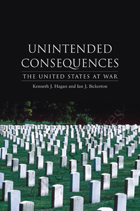
Though more than sixty years have passed since the signing of the proclamation of the State of Israel, the impact of that epochal event continues to shape the political policies and public opinion of not only the Middle East but much of the world. The consequent conflict between Arabs and Israelis for sovereignty over the land of Palestine has been one of the most bloody, intractable, and drawn-out of modern times. It continues today in cycles of aggressive violence followed by temporary, tenuous ceasefires that are marked and complicated by resolute opinions and fractious religious ideologies. In this timely volume, noted military historian Ian J. Bickerton cuts through the complex perspectives in order to explain this struggle in objective detail, describing its history from the dissolution of the Ottoman Empire following World War I to the present day.
In concise and clear prose, Bickerton argues that the present problem can be traced to the fact that each side is trapped by a conception of their past from which they seem unable to break free. This attachment and reaction to history has had a negative influence on the decision-making of Arabs and Israelis since 1948. Ultimately, Bickerton maintains that the use of armed force has not, and will not, resolve the issues that have divided Israelis and Arabs.
The Arab-Israeli Conflict is a plea for reasoned diplomacy in a situation that has been dominated by extreme violence. This book will appeal to a wide general audience seeking a balanced understanding of this enduring struggle that still dominates headlines.

“The United States does not do nation building,” claimed Secretary of Defense Donald Rumsfeld three years ago. Yet what are we to make of the American military bases in Korea? Why do American warships patrol the Somali coastline? And perhaps most significantly, why are fourteen “enduring bases” being built in Iraq? In every major foreign war fought by United States in the last century, the repercussions of the American presence have been felt long after the last Marine has left. Kenneth J. Hagan and Ian J. Bickerton argue here that, despite adamant protests from the military and government alike, nation building and occupation are indeed hallmarks—and unintended consequences—of American warmaking.
In this timely, groundbreaking study, the authors examine ten major wars fought by the United States, from the Revolutionary War to the ongoing Iraq War, and analyze the conflicts’ unintended consequences. These unexpected outcomes, Unintended Consequences persuasively demonstrates, stemmed from ill-informed decisions made at critical junctures and the surprisingly similar crises that emerged at the end of formal fighting. As a result, war did not end with treaties or withdrawn troops. Instead, time after time, the United States became inextricably involved in the issues of the defeated country, committing itself to the chaotic aftermath that often completely subverted the intended purposes of war.
Stunningly, Unintended Consequences contends that the vast majority of wars launched by the United States were unnecessary, avoidable, and catastrophically unpredictable. In a stark challenge to accepted scholarship, the authors show that the wars’ unintended consequences far outweighed the initial calculated goals, and thus forced cataclysmic shifts in American domestic and foreign policy.
A must-read for anyone concerned with the past, present, or future of American defense, Unintended Consequences offers a provocative perspective on the current predicament in Iraq and the conflicts sure to loom ahead of us.
READERS
Browse our collection.
PUBLISHERS
See BiblioVault's publisher services.
STUDENT SERVICES
Files for college accessibility offices.
UChicago Accessibility Resources
home | accessibility | search | about | contact us
BiblioVault ® 2001 - 2024
The University of Chicago Press









